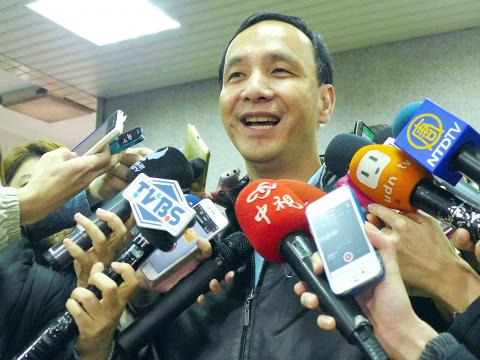The Democratic Progressive Party (DPP) yesterday accused the Chinese Nationalist Party (KMT) of trying to evade legislative oversight of cross-strait affairs following news reports that KMT Chairman and New Taipei City Mayor Eric Chu (朱立倫) is scheduled to meet with Chinese President and Chinese Communist Party (CCP) leader Xi Jinping (習近平) in May or June.
Chu said in Hong Kong on Monday that “it is natural” for the KMT chairman to attend the annual KMT-CCP forum, or the cross-strait economic, trade and culture forum that was launched in 2006 when the DPP was the ruling party.
China’s Taiwan Affairs Office responded quickly, with spokeswoman Fan Liqing (范麗青) saying on Tuesday that Chu was welcome to visit China at his convenience and to “work to promote cross-strait relations and cement the consensus on the ‘1992 consensus’ and the anti-independence stance.”

Photo: Lee Ya-wen, Taipei Times
According to the Chinese-language Apple Daily, which cited an anonymous KMT official in the report published yesterday, Chu has decided to visit China with a group to attend the 10th KMT-CCP forum and meet with Xi, which has received President Ma Ying-jeou’s (馬英九) support.
Mainland Affairs Council (MAC) Minister Andrew Hsia (夏立言) said that the council “would be glad to see” any interaction between the two parties as long as it is advantageous to the mutual understanding of the two sides of the Taiwan Strait.
Meanwhile, the DPP expressed concern that the KMT, as the ruling party, might force the public to accept any deals it struck with Beijing.
DPP caucus convener Tsai Chi-chang (蔡其昌) said that cross-strait negotiations have become “single-track” since the council took over and the Straits Exchange Foundation’s role was diminished. However, Chu is now trying to re-establish a “double-track negotiation system” with the KMT-CCP forum and seize the lead over Ma in cross-strait affairs.
A double-track system would allow negotiations to evade legislative scrutiny, he said.
“The DPP is for cross-strait interactions, but they have to be transparent and monitored,” he said.
“The cause of the Sunflower movement is still vivid in memory. The public will not accept any attempts to force them to swallow agreements borne out of negotiations that they had not sanctioned,” Tsai added.
DPP Legislator Lee Chun-yi (李俊俋) said a Chu-Xi meeting would allow Chu, as KMT chairman, to meet the Chinese president.
“But is the cross-strait relationship a party-to-party one? Is the KMT representative of the Taiwanese people?” Lee asked.
KMT Legislator Wu Yu-jen (吳育仁) said that the DPP could also set up its own forum with the CCP if it is “uncomfortable with the KMT-CCP forum.”

NATIONAL SECURITY THREAT: An official said that Guan Guan’s comments had gone beyond the threshold of free speech, as she advocated for the destruction of the ROC China-born media influencer Guan Guan’s (關關) residency permit has been revoked for repeatedly posting pro-China content that threatens national security, the National Immigration Agency said yesterday. Guan Guan has said many controversial things in her videos posted to Douyin (抖音), including “the red flag will soon be painted all over Taiwan” and “Taiwan is an inseparable part of China,” while expressing hope for expedited “reunification.” The agency received multiple reports alleging that Guan Guan had advocated for armed reunification last year. After investigating, the agency last month issued a notice requiring her to appear and account for her actions. Guan Guan appeared as required,

A strong cold air mass is expected to arrive tonight, bringing a change in weather and a drop in temperature, the Central Weather Administration (CWA) said. The coldest time would be early on Thursday morning, with temperatures in some areas dipping as low as 8°C, it said. Daytime highs yesterday were 22°C to 24°C in northern and eastern Taiwan, and about 25°C to 28°C in the central and southern regions, it said. However, nighttime lows would dip to about 15°C to 16°C in central and northern Taiwan as well as the northeast, and 17°C to 19°C elsewhere, it said. Tropical Storm Nokaen, currently

‘NATO-PLUS’: ‘Our strategic partners in the Indo-Pacific are facing increasing aggression by the Chinese Communist Party,’ US Representative Rob Wittman said The US House of Representatives on Monday released its version of the Consolidated Appropriations Act, which includes US$1.15 billion to support security cooperation with Taiwan. The omnibus act, covering US$1.2 trillion of spending, allocates US$1 billion for the Taiwan Security Cooperation Initiative, as well as US$150 million for the replacement of defense articles and reimbursement of defense services provided to Taiwan. The fund allocations were based on the US National Defense Authorization Act for fiscal 2026 that was passed by the US Congress last month and authorized up to US$1 billion to the US Defense Security Cooperation Agency in support of the

PAPERS, PLEASE: The gang exploited the high value of the passports, selling them at inflated prices to Chinese buyers, who would treat them as ‘invisibility cloaks’ The Yilan District Court has handed four members of a syndicate prison terms ranging from one year and two months to two years and two months for their involvement in a scheme to purchase Taiwanese passports and resell them abroad at a massive markup. A Chinese human smuggling syndicate purchased Taiwanese passports through local criminal networks, exploiting the passports’ visa-free travel privileges to turn a profit of more than 20 times the original price, the court said. Such criminal organizations enable people to impersonate Taiwanese when entering and exiting Taiwan and other countries, undermining social order and the credibility of the nation’s